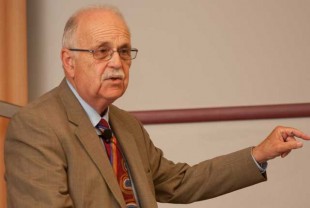BY TED WALKER
The career of scholar, public intellectual and 2012 Campbell Lecture Series speaker Stanley Fish is characterized by a refusal to gracefully accept commonly held notions. His unblinking rigor was on display at Rice University recently, when Fish focused his attention on this year’s topic: academic freedom.

Scholar Stanley Fish was the featured speaker of the 2012 Campbell Lecture Series at Rice University April 10-12.
“Academics believe that someone has to pay them,” Fish told the audience at Herring Hall April 10, “but that the someone that pays them has nothing to say about what they do. Isn’t that odd?”
The seventh annual School of Humanities Campbell Lecture Series invited Fish to speak in depth on academic freedom in three lectures and to publish a corresponding book.
As a scholar of law, literature and higher education, Fish was well-positioned to offer his analysis of academic freedom. He is currently the Davidson-Kahn Distinguished University Professor at Florida International University, he has taught at many universities and published numerous books and he is a widely read columnist for The New York Times and the Chronicle of Higher Education.
“This is a man who does not end conversations,” said Dean of Humanities Nicolas Shumway. “This is a man who begins conversations.”
True to form, Fish carefully disassembled the concept of academic freedom for examination and rebuilt a framework on which to view it.
Why can academics openly criticize their superiors while those outside of academia can’t? Does academic freedom protect the expression of a political viewpoint in or near the classroom? How far do the protections of academic freedom extend?
“Freedom is a contested concept,” Fish said. “It must be defined, so that the boundaries of the academic can come clearly into view.” One view holds that freedom is an overriding value that should extend into academia. Fish said he believes that its scope pertains to the core duties of the profession.
“Academics are professionals,” Fish said. “No more, no less.” Academic freedom should be constrained to that professor’s area of expertise, without including political opinion or social justice.
Fish then presented five schools of thought on academic freedom, even coining a new field: academic freedom studies. “This is something that a scholar rarely gets to do,” he said, “to inaugurate a new field by an act of fiat, and name its members, who, until he spoke, didn’t know that they were members of these various schools.”
At one end of his spectrum, Fish described the “It’s Just a Job” school — identifying himself as likely its only member — which treats academics as employees hired to perform a specific job, with freedom limited to that scope.
A second school values democracy and justice over professional concerns, a third holds that academics exist to correct the public’s errors and that they shouldn’t face the restrictions other public employees do. In the fourth school, academics shouldn’t be required to adhere to existing norms, and their dissent should be protected by academic freedom to drive social progress.
In the fifth school — furthest from Fish’s stance — academic freedom expands to protect the whole world. This “It’s Revolution” school moves political agendas to the forefront; politics override academics. “I thought I was being trained as a scholar of medieval literature,” said Fish sardonically, speaking as a hypothetical professor, “and here I’m being told I should go out into the world and alleviate misery, and fight corruption and despotism!”
Fish spoke against such protections in favor of politically neutral academic discourse, with unbiased analysis as the priority and sole motivation.
“If a conclusion is built-in, it is not protected by academic freedom,” Fish said. “No one’s political position should be a matter of discussion or revelation, period.”
Fish presented two more talks, on April 11 and 12, titled “Philosophy, Politics and Academic Freedom” and “Democracy and Academic Freedom.”
The School of Humanities’ literary studies lecture series was established with a $1 million contribution from alumnus T.C. Campbell ’34 to support a commitment to the study of literature. The annual 20-year lecture series is open to the public and presents original ideas on topics of interest in literature. For more information, visit http://campbell.rice.edu.


Fish becomes more jerky as time goes on. He began as a scholar who envisioned teachers as people with a democratic (small d) mission. Now he sees it as just another factoy job. Perhaps that’s when you move from workers (who would want some protection, rights, and dignity in the workplace) to a boss who wants complete control and rationalized productivity for highest profits. But most good educational “bosses” realize that such rationalization makes for BAD teaching. He has forgotten that academic freedom is necessary for most of us to DO what we were hired to DO best. I don’t know too many teachers who disregard evaluation of their work–they just don’t want their paycheck determined by whether or not they have upset anyone with their work because a student didn’t like their homophobia or white supremacy or even liberalism challenged. Can you imagine working for someone as limited as Fish and not having the freedom to criticize the boss? Let me just add that ALL workers believe (or should believe) that they have the right to criticize the boss–since when does a paycheck mean you lose your bill of rights? Should we further chill or even outright ban whistleblowing? Ugh, thank God there are only three of these lectures–can you magine the poor folks of florida international who have to put up with him on a regular basis? I’m not surprised the Tmes pays him to write–they also pay David Brooks.